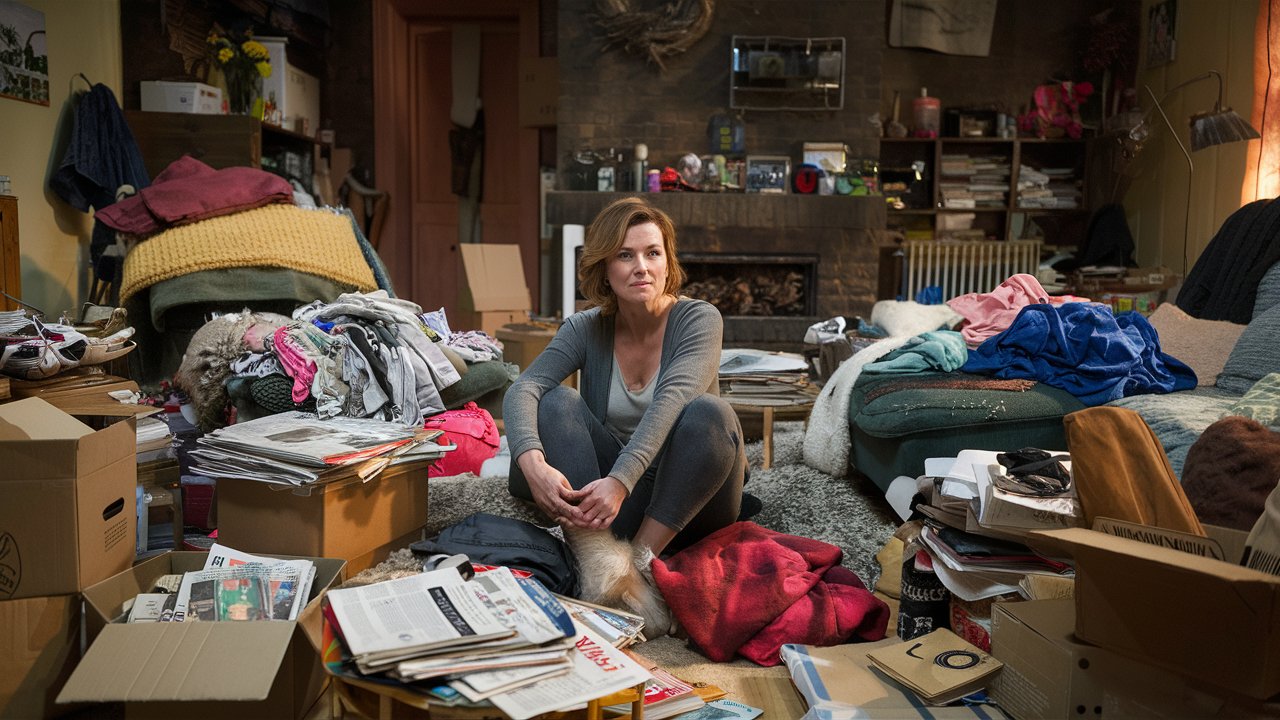Coping with Life Changes, Challenges and Transitions Series
Theresa stood in the middle of her living room, surrounded by piles of paperwork from years gone by, dusty stacks of old newspapers and magazines, bulging boxes of “fat” clothes and “thin” clothes, some never worn, and an eclectic collection of thoughtless gifts. After 20 years of living, or rather existing, in the same old house, a recent divorce had thrown her kicking-and-screaming, right into the middle of a debilitating life transition. She sneezed as she picked up a sticky photo album from a shelf, she realized it wasn’t just her failed marriage that she had to let go—it was the mountains of useless clutter that had silently accumulated over the years, and were now threatening to suffocate her.
I am no minimalist, but I have found that decluttering during a life transition, challenge of change, such as moving house, getting divorced, changing careers, losing someone you love or finding yourself with an empty nest, can be useful in more than one way. For one thing, life transitions often involve long waiting periods, and decluttering can give you something mood-lifting to do.
During a major life change decluttering may seem like an impossible task to set yourself, to motivate and inspire you, read through the benefits listed below.
The secret is to start small.
.
Decluttering during life transitions can:
(I have tried to order the benefits below according to their usefulness, starting with those that were useful to me. Everyone and every transition is different, you may find benefits at the bottom of this list at the top of yours!)
1. Reduce Stress: Clutter can make you feel anxious and overwhelmed, as a disorganised space often mirrors a chaotic mind.
2. Boost Mental Clarity: When your surroundings are free of unnecessary items, it’s easier to concentrate on the tasks at hand and make thoughtful decisions during a life transition.
3. Enhance Self-Awareness: Understanding why you’ve held onto certain items and recognizing what you value can provide insights into your personality, preferences, and priorities.
4. Facilitate a Fresh Start: Clearing clutter helps you physically and symbolically make space for new opportunities, relationships, and experiences, enabling you to move forward and make a fresh start.
5. Increase Productivity: A tidy environment can significantly boost your productivity. Without the distraction of clutter, you can work more efficiently, whether you’re setting up a new home office, starting a new project, or simplifying your daily routine.
6. Promote Better Sleep: By removing unnecessary items and creating a peaceful sleeping environment, you enhance your ability to rest and recharge, which is crucial during times of change.
7. Improve Physical Health: The act of sorting, cleaning, and organizing can be a form of physical activity. Additionally, reducing clutter can help minimize dust and allergens in your home, leading to a healthier living space.
8. Encourage Mindfulness: Deciding what to keep and what to discard, can be an excellent mindfulness exercise, as you concentrate on staying present in the moment and to not get lost in memories of the past or trapped by your fears for the future.
9. Save Time and Energy: A clutter-free home is easier to maintain and clean. By decluttering, you reduce the time and energy spent searching for items, cleaning around piles of stuff, and managing your space, allowing you to focus on more meaningful activities.
10. Letting go of items associated with past experiences can be emotionally liberating. Decluttering allows you to release the negative emotions tied to those items, paving the way for emotional healing and manifesting a new chapter in your life.
11. Create a Sense of Accomplishment: The process of decluttering, sorting, and organising can boost your confidence and motivate you to tackle other aspects of your life transition.
12. Enhance Creativity: Without the visual and mental distractions of clutter, your mind is free to explore new ideas and engage in creative thinking.
13. Increase Financial Stability: Selling unwanted items can generate extra income, and sometimes become a profitable side hustle or even main income. Additionally, being organised helps you avoid unnecessary purchases by knowing exactly what you have.
15. Cultivate Useful Habits: The practice of decluttering can lead to the development of better organisational habits. Maintaining a clutter-free space encourages regular tidying and mindful consumption, fostering long-term discipline and organization.
16. Strengthen Relationships: A tidy, ordered home can improve relationships with those who live with you. It reduces conflicts over misplaced items and creates a more harmonious living environment.
17. Promote Decision-Making Skills: Decluttering requires making decisions about what to keep and what to let go of. This practice can enhance your decision-making skills, making it easier to make other important choices during life transitions.
18. Make your living space is more visually appealing: Creating an environment that reflects your style and preferences can boost your mood and make your home a more enjoyable place to live.
19. Decluttering helps you reduce the physical and emotional baggage you carry. Whether it’s an unexpected move, a new job, ta break up or a redundancy, being organised makes the process smoother and less overwhelming.
20. Increases Overall Happiness: Controlling your physical environment can positively impact your emotional well-being, making you feel empowered and at peace.
Conclusion
With each item Theresa decided to discard, she felt a weight lift off her shoulders. The process wasn’t just about tidying up; it was about making space for new opportunities. In the midst of her life transition, getting rid of the clutter became a powerful act of reclaiming her life, her freedom, and her future.
Decluttering during life transitions is more than just tidying up; it’s a transformative process that can significantly impact your mental, emotional, and physical well-being. For Theresa, it was a journey of emotional release, mental clarity, and personal empowerment. By embracing the process of getting rid of clutter, you can not only create a more restful living space but also pave the way for a smoother, more positive transition into the next chapter of your life. Whether it’s enhancing creativity, supporting financial well-being, or preparing for future changes, the benefits of decluttering are profound, long-lasting and far-reaching.
A clutter-free environment can be a key factor in successfully managing a life transition.
« In any given moment we have two options: to step forward into growth or step back into safety.” — Abraham Maslow

In addition to the Your Next Chapter retreats that I host at my little French farm near Bordeaux, I have also created a couple of online courses, ex. Break Free from Uncertainty and Get Going in a New Direction – each course is available with or without one-to-one coaching. To receive warning of last-minute and early-bird specials on all of the above, I invite you to subscribe to my Savoir Vivre Vignettes newsletter which gives immediate access to my free A Stress-free Life Transition e-course.

